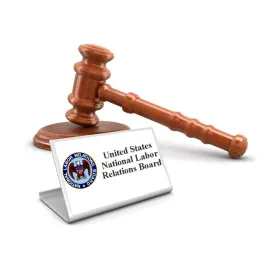The National Labor Relations Board (NLRB) Acting General Counsel Peter Sung Ohr (AGC) has announced in a memorandum that his office will return to “vigorous enforcement” of employee rights under Section 7 rights of the National Labor Relations Act (NLRA).
The initiative announced on March 31, 2021, is reminiscent of the Obama Board’s focus on protected concerted activities in both union and non-unionized workplaces. During the Obama administration, the Board sought to educate employees of their rights to engage in protected concerted activities. Together with a series of Board case decisions that significantly expanded Section 7 protections in the non-union setting, that era brought a dramatic increase in the number of unfair labor practice charges unrelated to union activity filed against employers.
During the Trump administration, the Republican-led Board issued a number of decisions that narrowed Section 7’s protections. However, the AGC memorandum portends that those employer gains may be short lived. As the COVID-19 pandemic continues to change the workplace, employers may face a surge in protected concerted activities claims.
AGC Memorandum
The AGC memorandum starts by addressing the relationship between protected concerted activities and union activity:
While protected, concerted activity can be a precursor to a union campaign, it also can occur outside of the context of union activity, such as in instances where employees raise safety concerns to their employer, or seek protections from government agencies.
Many employees and employers do not realize that Section 7 protections apply beyond union activity.
The AGC states his intention to challenge Trump administration decisions curbing expansive interpretations of protected concerted activities:
I look forward to robustly enforcing the Act’s provisions that protect employee Section 7 rights with full knowledge that recent decisions issued by the current Board have restricted those protections.
While the current Board maintains a 3-1 Republican majority, Democrats will gain a majority as soon as late-August 2021, when Republican member William Emanuel’s term expires and the vacancies are filled by Biden appointees. Therefore, as early as this fall, a newly constituted board will be able to begin issuing decisions that, once again, could significantly expand the scope of Section 7’s protections under the NLRA.
The AGC outlines areas he believes should be expanded by the future Board. The “mutual aid or protection” requirement focuses on the “goal of the concerted activities” and requires a “link between the activity and matters concerning the workplace or employees’ interests as employees.” [Citing Fresh & Easy Neighborhood Market, Inc., 361 NLRB 151, 153 (2014).] The Board during the Obama years found a wide range of employee conduct was for the “mutual aid or protection,” even when the connection to employment was tenuous at best.
The AGC encourages a broader view of Section 7’s protections to cover a wide range of conduct, including “employees’ political and social justice advocacy when the subject matter has a direct nexus to employees’ ‘interests as employees.’” The memorandum provides examples of conduct the AGC believes falls within this protected area of workplace “political or social justice advocacy”: media interviews regarding living on minimum wage; an employee’s “solo” strike to join a demonstration advocating for a $15-per-hour minimum wage; and protests over workplace immigration raids by the government.
The AGC says, “[E]mployee activity regarding a variety of societal issues will be reviewed to determine if those actions constitute mutual aid or protections under Section 7 of the Act.” Therefore, although private sector employees generally do not have free speech protections in the workplace, employers must be mindful that an incoming Board may view political expression as protected under Section 7 of the NLRA.
The AGC advocates rejection of Trump Board decisions contrary to his expansive view of Section 7. He seeks expansion of Board law on actions by individual employees that, by their nature, are “inherently concerted.” The AGC will be looking to expand the concept of “inherently concerted” to include discussions by employees on a wide range of topics beyond the “vital categories of workplace life,” such as those concerning workplace health and safety and unlawful discrimination.
Renewed Focus Will Likely Result in More Charges and Complaints Against Employers
A renewed focus on protected concerted activities cases, including cases outside traditional union activity, is significant for employers. The initiative revives efforts started by the Obama Board to expand the agency’s reach beyond organized labor. With union organizing in continued decline, the future of the Board cannot be tied to the future of organized labor. The Obama Board’s efforts resulted in an increase in the number of unfair labor practice charges alleging retaliation for engaging in non-union protected concerted activities. Like the Obama Board, the AGC’s declared policy seeks to stretch the protections of Section 7 to employee conduct having only a tenuous connection to the employees’ terms and conditions of employment. Under the AGC’s view, to garner the protections of Section 7, employees have to simply do what many employees are already doing daily: complain to a coworker about a term or condition of employment or engage in social activism, even if only tangentially relevant to the workplace.
The COVID-19 pandemic is bringing dramatic changes to workplaces across the country. Those changes create an environment ripe for protected concerted activities. As a result, the Board has seen a significant increase in the number of unfair labor charges relating to COVID-19 in the workplace. These claims are based on issues that nearly all employers have had to grapple with over the past year, such as allegations of inadequate personal protective equipment, failure to follow Centers for Disease Control and Prevention quarantine guidelines, and a host of other issues unique to the pandemic. With the pandemic continuing to bring change in the workplace, employers must understand that employee discussions regarding these COVID-19-related changes are likely protected under Section 7.
What makes Section 7 such a powerful tool for employees is the broad nature of its protections. While anti-discrimination statutes protect employees who complain to an employer about a certain type of workplace misconduct (i.e., discrimination or retaliation), Section 7 protects employees who concertedly discuss (not even complain) any term or condition of employment. Moreover, while most supervisors understand that an employee’s complaints about discrimination or harassment would entitle the employee to certain protections, few supervisors are aware of, or understand, the broad protections provided to employees by Section 7 of the NLRA.
Employers Should Proactively Address the Risk of Claims
As the Board ramps up its outreach campaign to educate workers on their rights to engage in these protected concerted activities, many employees may find the NLRB a more attractive option than asserting other claims before other state or federal agencies. Unlike most of the discrimination statutes, an employee pursuing a claim under Section 7 does not need to retain private counsel, which means the economic barriers are lower. If the NLRB’s General Counsel finds merit to the allegations in the charge, it issues the complaint and prosecutes the matter at no cost to the employee.
The Board’s outreach effort also addresses the widespread misunderstanding that the Section 7 concerns only anti-union discrimination. While the Board seeks to educate workers on these rights, employers should ensure their own supervisors understand the protections provided to workers under Section 7. Employers should consider training their supervisors and human resources teams on identifying protected concerted activities and developing strategies to best respond to employees who engage in such conduct. Without a full understanding of these protections, employers face a significant risk they may find themselves defending a protected concerted activities charge in front of the Board, which will become increasingly friendly to employees over the next few years.







 />i
/>i
